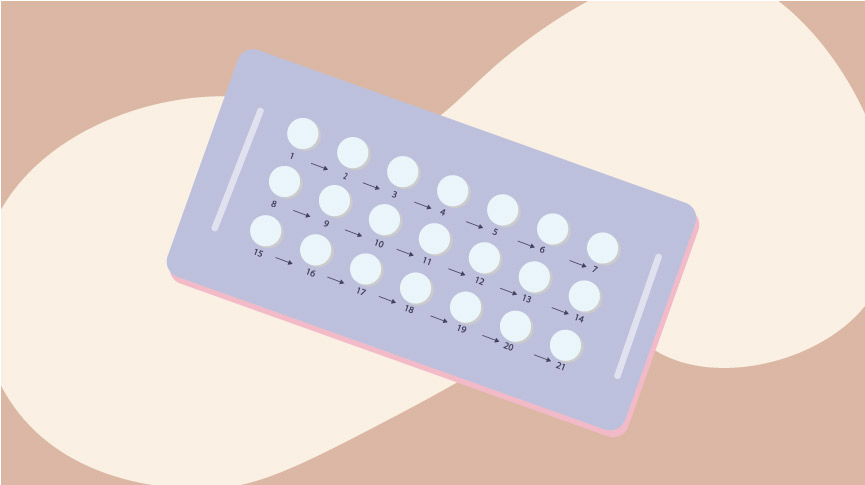Birth Control and Your Liver

Hormonal birth control was an incredible invention that gave people with uteruses more bodily autonomy, freedom over their lives, and more tools to navigate their reproductive health with.
There’s a good chance that you and a good amount of your friends were put on it from a very young age as a means of birth control, to help regulate periods, or for other common reasons like acne.
In recent years there has been more and more conversation around the widespread use of hormonal birth control, mainly that it might not be all that it’s chalked up to be.
Using hormonal birth control can lead to all sorts of unexpected side effects like acne, weight gain, mood fluctuations, loss of libido, nausea, and headaches.
Like any medication, taking birth control can be taxing on different parts of your body, particularly the liver.
Let’s take a look at what the liver is, how hormonal birth control might affect it, and what to do about it.
What is The Liver?
First things first. You have to have a basic understanding of what the liver does to understand the effects of hormonal birth control on it.
The liver is one of the important organs in your body – and one of the largest. This football-sized organ is located on the upper right side of your abdomen.
This vital organ is incredibly busy and quite the efficient multitasker. It has hundreds of functions including filtering and processing chemicals in foods, medications, and alcohol, helping digest fats and eliminating waste products, storing nutrients, filtering the blood, and much more. Essentially the liver is in charge of detoxification, waste management, and sorting nutrients so they can be used efficiently.
Did you catch the first one on that list? Filtering chemicals in food and medications.
Chemicals aren’t necessarily a bad thing. We’re surrounded by them, and for the most part, the liver does a pretty great job of filtering them.
That doesn’t mean it doesn’t get tired from time to time. Especially if more chemicals are constantly being added to your system.
So what does that have to do with birth control?
How Does Birth Control Affect The Liver?
Pharmaceutical hormonal birth control options are medications, made from chemicals, that your liver has to filter.
The liver helps repackage harmful chemicals into less harmful ones and then transforms them into water-soluble substances so that they can be released via urine or faeces. When these systems are backed up or taxed, toxins can build up in the system.
Consistently taking artificial hormones can result in hormonal imbalances, specifically estrogen dominance.
This can lead to a sluggish liver and slowed bile production. Studies have shown that the use of hormonal birth control increases someone’s risk of developing liver tumours and cancer, jaundice, clotting of the liver’s veins, and other issues.
Birth Control and Your Liver: What’s Next?
If you or someone in your family has a history of liver or gallbladder disease, you may want to keep this on your radar.
For hormonal birth control users concerned about their liver health – observe any symptoms that may be indicative of liver issues like:
- Reproductive health disorders like PCOS and fibroids
- Jaundice
- Constipation
- Acid reflux, heartburn, bloating, and gas
- High blood pressure
- Chronic fatigue
- Mood imbalances
Try not to get ahead of yourself. If you are curious about your health, be sure to consult a medical practitioner who can get you the tests and answers you need.
Here are some other tips to consider:
- Decide if hormonal birth control is right for you versus other options like barrier methods (condoms) and cycle tracking (condoms during ovulation).
- Consider doing a birth control cleanse if you go off of it, although it’s certainly not necessary.
- Support your liver health by eating a balanced diet (organic when possible), staying well hydrated, minimizing alcohol, and taking herbs like milk thistle and dandelion.
Things to Remember About Hormonal Birth Control
Only you can decide whether hormonal birth control is right for you or not. At Intimina, we’re all about informed choice. That means giving you the knowledge and information you need to help guide you so that you can make the right choice for your particular needs.
While birth control may have its downsides, it’s also really beneficial for a lot of people who use it to regulate health conditions, who can’t rely on other forms of birth control, or people who just feel like it’s the best choice for them.
If you’re considering going on or off birth control, talk to your OB/GYN about what options you have, and keep listening to your body and your intuition.
In case you needed a little reminder, hormonal birth control does not protect you from sexually transmitted infections. It’s still important to take steps to prevent transmission like getting tested for STIs, talking to your partner about their sexual health, and using barrier methods like condoms and dental dams when necessary.

Natasha (she/her) is a full-spectrum doula and health+wellness copywriter. Her work focuses on deconstructing the shame, stigma, and barriers people carry around birth, sex, health, and beyond, to help people navigate through their lives with more education and empowerment. You can connect with Natasha on IG @natasha.s.weiss.



people with uteruses? You mean women?